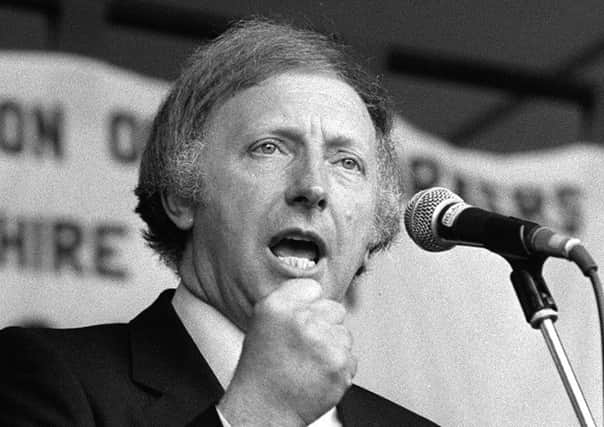Scargill MP bid set for defeat: The week that was November 1-6, 1986.


Mr Scargill’s reported plan to enter Parliament as the member for his home town had sent shockwaves through the party and some sections of his union.
The NUM-sponsored seat, one of the safest in the country, was to become vacant when Mr Mason, a former Northern Ireland Secretary and Minister of Defence, retired at the next general election.
Advertisement
Hide AdAdvertisement
Hide AdAlthough the NUM was the most powerful bloc in the Constituency Labour Party, moderates and right-wingers in the party had become increasingly dissatisfied with the miners’ union. Public service union NUPE and transport union the TGWU were also growing and flexing their muscles to take on the might of the NUM. One prominent miners’ leader said: “It’s unlikely that Arthur will get the nomination. It would cause all hell to break loose.”
Britain’s 500,000 nurses were having to contend with more and more violent patients and should be taught martial arts for their own safety, said the Royal College of Nursing. It said health authorities should foot the bill for such training, in order to help staff ward off attackers and rapists.
Tory chairman Norman Tebbit sought to justify his attacks on the BBC in the wake of strong reaction from journalists and other politicians.
BBC reporter Kate Adie, who spent 11 days in Tripoli at the time of the US raid on Libya, led the charge against Mr Tebbit, who had denounced BBC coverage of the April bombings as a “mixture of news, views, speculation, error and uncritical carriage of Libyan propaganda.”
Advertisement
Hide AdAdvertisement
Hide AdAdie said she was seeking legal advice about the criticisms contained in a Tory Party report on the BBC’s coverage, and said she stood by every word she had broadcast.
The row rumbled on, with William Rees-Mogg, BBC chairman at the time of the raid, saying Mr Tebbit had “gone over the top” and the Tory chairman retorting that the BBC had a duty to be impartial.
Meanwhile, thousands of calls flooded into the Childline telephone service for abused children following its live TV launch by Esther Rantzen. Counsellors handled around 50,000 calls within 24 hours of the programme’s broadcast.
Callers included troubled teenagers, adults talking about abuse suffered when they were children, as well as abused children. The youngest caller was seven.
Advertisement
Hide AdAdvertisement
Hide AdElsewhere, a catastrophic fire at a chemical factory near Basel, Switzerland, sent tonnes of toxic chemicals into the River Rhine, turning it red. The blaze was in a storage building used for pesticides, mercury and other highly poisonous agricultural chemicals made by Sandoz.
Residents in the area were told to stay indoors, and 14 people were treated for chemical inhalation. An investigation was under way into the cause of the fire, which caused 30 tonnes of chemicals to contaminate western Europe’s most important waterway, which runs through Switzerland, Germany, France and Holland.
A nine-foot bronze statue of Bradford-born writer J B Priestley was unveiled this week by his widow. The £30,000, nine-foot sculpture – paid for by the Bradford council and sited on a plinth close to the Central Library and Alhambra Theatre – was declared by Jacquetta Priestley to be “... a fine work of art, and an incredible likeness. It is full of life, and I think he would have liked it”.